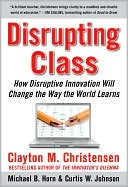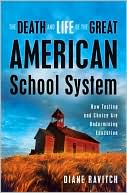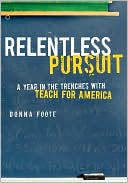Disrupting Class: How Disruptive Innovation Will Change the Way the World Learns
Search in google:
WARNING: THIS BOOK WILL CHALLENGEEVERYTHING YOU EVER LEARNED-ABOUT LEARNING“After a barrage of business books that purport to 'fix' American education, at last a book that speaks thoughtfully and imaginatively about what genuinely individualized education can be like and how to bring it about.”-Howard Gardner, author of Five Minds for the Future“A decade ago, Clayton Christensen wrote a masterpiece, The Innovator's Dilemma, that transformed the way business looks at innovation. Now, he and two collaborators, Michael B. Horn and Curtis W. Johnson, have come up with another, focusing his groundbreaking theories of disruptive innovation on education."-David Gergen, US Presidential Advisor“Clayton Christensen's insights just might shake many of us in education out of our complacency and into a long needed disruptive discourse about really fixing our schools. This will be a welcome change after decades in which powerful calls to action have resulted in only marginal improvements for our nation's school children.”-Vicki Phillips, director of Education, Gates Foundation“Full of strategies that are both bold and doable, this brilliant and seminal book shows how we can utilize technology to customize learning. I recommend it most enthusiastically.”-Adam Urbanski, president of the Rochester (NY) Teachers Association, and vice president of the American Federation of Teachers"Finally we have a book from the business community that gets it. Disrupting Class from Clayton Christensen and colleagues points out that motivation is central to learning and that if schools and learning are to be transformed as they must be, motivation must be at the center of the work. They also point out how technology should be used to personalize learning and what the future might look like for schools. A must read for anyone thinking and worrying about where education should be headed."-Paul Houston, Executive Director, American Association of School Administrators“Powerful, proven strategies for moving education from stagnation to evolution.”-Christopher Dede, Timothy E. Wirth Professor in Learning Technologies, Harvard Graduate School of Education“Clayton Christensen and colleagues describe how disruptive technologies will personalize and, as a result, revolutionize learning. Every education leader should read this book, set aside their next staff meeting to discuss it, and figure out how they can be part of the improvement wave to come.”-Tom Vander Ark, President, X PRIZE Foundation“In Disrupting Class, Christensen, Horn and Johnson argue that the next round of innovation in school reform will involve learning software. While schools have resisted integrating technology for instruction, today's students are embracing technology in their everyday lives. This book offers promise to education reformers.”-Kathleen McCartney, Dean, Harvard Graduate School of Education“The genius of Disrupting Class is the spotlight the book throws on how we can tap children’s early enthusiasm for school by letting them learn in best-choice, individualized ways, the teacher’s role transformed from ‘sage on stage’ to ‘guide on the side.’”—Seattle Times & Post-IntelligencerClayton M. Christensen is the Robert and Jane Cizik Professor of Business Administration at the Harvard Business School. He is co-founder of Innosight, a management consultancy, Rose Park Advisors, an investment firm, and Innosight Institute, a non-profit think tank. Christenen is the author or coauthor of five books including the New York Times bestsellers The Innovator’s Dilemma and The Innovator’s Solution. He serves as a leader in the Church of Jesus Christ of Latter-day Saints.Michael B. Hornis a cofounder and Executive Director of Innosight Institute. He holds an AB from Yale and an MBA from Harvard.Curtis W. Johnson is a writer and consultant who has served as a college president, head of a public policy research organization, and chief of staff to governor Arne Carlson of Minnesota. Johnson and his colleagues were among the early proponents of what has become the chartered school movement. Publishers Weekly It's no secret that people learn in different ways, so why, the authors of this book ask, "can't schools customize their teaching?" The current system, "designed for standardization," must by its nature ignore the individual needs of each student. The answer to this problem, the authors argue, is "disruptive innovation," a principle introduced (and initially applied to business) by Harvard Business School professor Christensen in The Innovator's Dilemma. The idea is that an audience in need will benefit from even a faulty opportunity to fulfill that need; in education, the demand for individual instruction could be met through infinitely customizable online computer-based instruction. The authors, all professionals in education, present a solution to the ills of standardized education that's visionary but far-fetched; even they admit that their recommendations would be extremely difficult to implement in current school systems. Still, the authors' unusual case, though occasionally bogged down in tangents, is worthy reading for school administrators, teachers, parents and, perhaps most of all, software developers. Charts. Copyright © Reed Business Information, a division of Reed Elsevier Inc. All rights reserved.
Introduction 1Randall Circle High School 19Ch. 1 Why Schools Struggle to Teach Differently When Each Student Learns Differently 21Ch. 2 Making the Shift: Schools Meet Society's Needs 43Ch. 3 Crammed Classroom Computers 71Ch. 4 Disruptively Deploying Computers 89Ch. 5 The System for Student-Centric Learning 121Ch. 6 The Impact of the Earliest Years on Students' Success 147Ch. 7 Improving Education Research 159Ch. 8 Forging a Consensus for Change 179Ch. 9 Giving Schools the Right Structure to Innovate 197Conclusion 223Index 231







